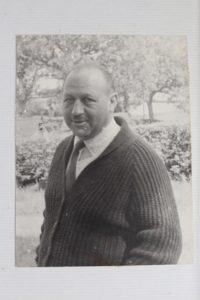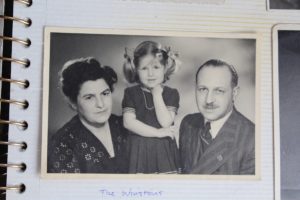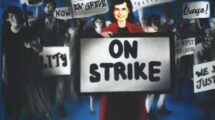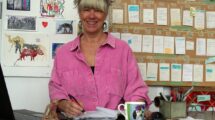A Father’s Day Gift Remembered
By Iris Winston
A small reading lamp was probably the most important gift I ever gave my father. Inexpensive as it was, it showed him I had listened when he said he must be getting old because he could no longer read easily in bed.

I will always be glad I gave it to him at the supper table the day I bought it, instead of saving it for Father’s Day. That evening, I went out with some university friends. When I came back, I stopped by my parents’ bedroom to say good night. They were both reading in bed, partly to test the new lamp and partly as a cover for waiting up until I was safely home. I had just reached my own bedroom when I heard my mother scream. Even before I reached her side, I knew why.
My father had suffered a massive coronary. When he had had his first heart attack a decade earlier, the doctor warned he would be living on borrowed time for the rest of his life. But he never seemed to worry. Beating the spectre of death became something of a game for him. He was proud when he could leave his bed a month or two before his doctor said he should.
 Soon, he was working his usual long hours, playing cards or heading off to watch a soccer game after work. He chose to live as though he was healthy and his determination made it hard for us to remember he was a sick man. So the sense of danger receded over the years. This time, though, he didn’t win the battle. My father died that night.
Soon, he was working his usual long hours, playing cards or heading off to watch a soccer game after work. He chose to live as though he was healthy and his determination made it hard for us to remember he was a sick man. So the sense of danger receded over the years. This time, though, he didn’t win the battle. My father died that night.
He had always known he would die young. In fact, he would have chosen an early end, for he carried a burden of sorrow far greater than poor health. He had lost his own father to the gas chambers of Auschwitz and was himself imprisoned in Dachau in 1938. One of a handful of prisoners to escape death, he managed to reach England a year later and immediately joined the British army.
The Holocaust and the war took much from him. Persecuted for being a Jew, he was attacked, imprisoned and tortured; he also lost relatives, his homeland, his profession and all his worldly possessions.
The child of a family bankrupted by the aftermath of World War I, he had put himself through university in Vienna while working full-time. A Classics scholar, he had completed a law degree and had been practising for a short while before the Nazis’ annexation of Austria and the end of the life he intended.
Starting over in England, he would have had to study for three years and take the bar exams again to work as a lawyer. The prospect was simply too much, though his belief in the power of law had been a driving force once. Instead, he got a job as a clerk in a cardboard box factory and learned the business quickly. Within two years, he set out on his own and built a successful small business. It provided for his family but gave him little satisfaction. He no longer thought in terms of a personal or professional future.
 His back bore the marks of suffering. His eyes told of spiritual scarring. It had taken courage and will to rebuild life in a new country. He was grateful to England for taking him in and loyal to his adopted country, but immigration had not been a matter of choice. He had been forced to flee on pain of death.
His back bore the marks of suffering. His eyes told of spiritual scarring. It had taken courage and will to rebuild life in a new country. He was grateful to England for taking him in and loyal to his adopted country, but immigration had not been a matter of choice. He had been forced to flee on pain of death.
I didn’t understand all this as a child. I just knew that the man who was so loving and protective of his family was often sad and silent. Little wonder that he never wanted to live to be old when he couldn’t escape the shadows of the past.
But he did want to live long enough to make my future as smooth as he could. He taught me to make the most of any opportunities and mental gifts I had. My father died before I had finished my first degree, but not before he had instilled in me his love of learning.
I came to Canada a year after he died. I sent my mother a bouquet of flowers shortly after I arrived, intended as a reminder of our plan that she would join me in a year or two. The flowers arrived on the anniversary of my father’s death. My mother assumed I had remembered. I never told her it was simply a happy coincidence, thinking that her pleasure surely outweighed the minor subterfuge. Like the lamp for my father, that bouquet became a special gift because my mother died soon after receiving it. She, too, was worn out by her wartime experiences. Both my parents were in their 50s when they died.






